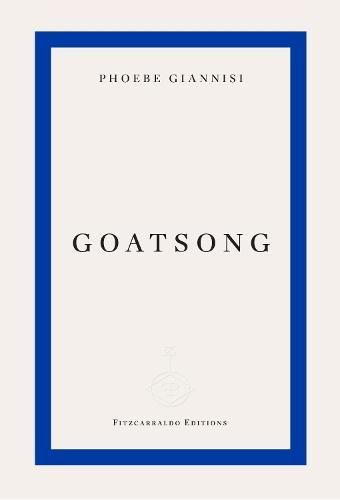Overview
The ancient Greek word for tragedy (τραγωδία) is a compound of goat (τράγος) and song (ᾠδή). In Phoebe Giannisi's Goatsong, the seam that connects human and animal, myths and history, is the body. In Giannisi's language, life obeys myth. A man places a screaming cicada in his mouth, reminding us of a scene from Plato's Phaedrus, where Socrates claims cicadas to have been humans who became entranced by the invention of singing, and didn't stop to eat or drink. When the goddess Thetis dips her newborn son, Achilles, into the River Styx to protect all but his famous heel where her hand grips, we're told 'the place of the mother's grip / is the mark of death.' Adjacent to the mythical setting is the material, where the rumination of goats, their digestive cycle - chewing, swallowing, then recalling food back into the mouth to be reconsidered - begins after weaning, and is lain alongside how we think: 'from the moment of separation / from the mother / they ruminate.' In these lyric enactments, all is transformative and transformed; territories of land, the body and history are blurred, and nothing is still. From Homer to Donna Haraway, Derrida to state archives, klephtic ballads and rebetiko, to Parmenides and Giannisi's dog, Ivan, the many human and animal voices of Goatsong form an incantatory lyricism and layered engagement unique in literature.
Full Product Details
Author: Phoebe Giannisi ,
Brian Sneeden
Publisher: Fitzcarraldo Editions
Imprint: Fitzcarraldo Editions
ISBN: 9781804271896
ISBN 10: 1804271896
Pages: 300
Publication Date: 06 November 2025
Audience:
General/trade
,
General
Format: Paperback
Publisher's Status: Forthcoming
Availability: Not yet available

This item is yet to be released. You can pre-order this item and we will dispatch it to you upon its release.
Language: Greek, Modern (1453-)
Reviews
‘A book that is also an ecosystem, full of impossible crossings and alive with unexpected communions.’ — Fani Avramopoulou, Antiphony (praise for Chimera) ‘Some of the best of her lyric writing… strange and captivating.’ — Publishers Weekly (praise for Chimera) ‘Giannisi is unquestionably herself within a vanguard of Greek poets for whom self-awareness and honesty have become second nature.’ — Shon Arieh-Lerer, World Literature Today (praise for Chimera) ‘An intimate and utterly feminine perspective on language and regeneration.’ — Jessica Gigot, The New York Times (praise for Chimera)
‘Goatsong intoxicates with its animality of language, gorgeous lyric and off-kilter metamorphoses, by turns wry, ecstatic and strange. Reading Phoebe Giannisi is like reading pre-Socratic philosophy on all fours, where flies buzz on and off the page and the polyphony of species and elements is both dazzling subject and all-encompassing medium.’ — Daisy Lafarge, author of Paul ‘I was immersed in Phoebe Giannisi’s Goatsong. I grieved with her as a mother, and rejoiced with her as a lover of all wild and wonderful places. Her work lives in me and inspires me to work harder to capture the truth – as the best poetry always does.’ — Sasha Dugdale, author of The Strongbox ‘A book that is also an ecosystem, full of impossible crossings and alive with unexpected communions.’ — Fani Avramopoulou, Antiphony (praise for Chimera) ‘Some of the best of her lyric writing… strange and captivating.’ — Publishers Weekly (praise for Chimera) ‘Giannisi is unquestionably herself within a vanguard of Greek poets for whom self-awareness and honesty have become second nature.’ — Shon Arieh-Lerer, World Literature Today (praise for Chimera) ‘An intimate and utterly feminine perspective on language and regeneration.’ — Jessica Gigot, The New York Times (praise for Chimera)
Author Information
Phoebe Giannisi is the author of eight collections of poetry. A 2016 Humanities Fellow of Columbia University, Giannisi is a professor of architecture at the University of Thessaly, and co-editor of the literary journal frmk. She has translated Ancient Greek lyric poetry as well as the poetry of Barbara Koehler, Gregor Laschen, Jesper Svenbro and André Pieyre de Mandiargues. She lives in Volos, Greece.



